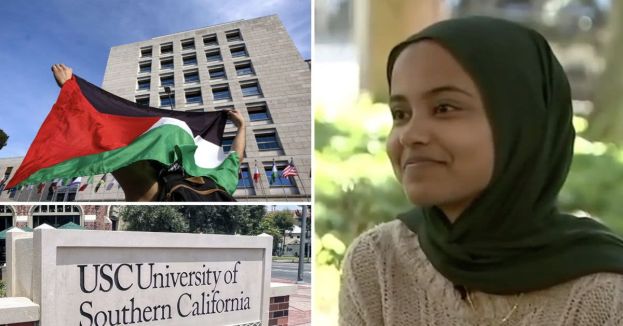The university's decision has sparked a heated debate about freedom of speech and academic discourse.
Tabassum, who also minored in "Resistance to Genocide," a course that investigates the causes, outcomes, and representations of attempted genocide and resistance to genocidal mass violence, has been accused of promoting "antisemitic and anti-Zionist rhetoric" on social media. Critics pointed to a link on her public Instagram profile that led to a website characterizing Zionism, a movement advocating for the development and protection of a Jewish state, as a "racist settler-colonial ideology."
Tabassum, a Muslim and pro-Palestinian, defended her actions, stating that the link was from years ago and her social media accounts have always been private. She told CBS News' Carter Evans, "I'm not apologizing for the link that I put in my Instagram. What I am saying is that I'm committed to human rights. And I'm committed to the human rights for all people." She vehemently denied accusations of devaluing Jewish lives, describing them as "simply not true."
WATCH: NICOLE WALLACE AND THE END OF DEMOCRACY![]()
In a statement released through the Council on American-Islamic Relations-Los Angeles, Tabassum claimed she has been subjected to a "campaign of racist hatred" from "anti-Muslim and anti-Palestinian voices" due to her "uncompromising belief in human rights for all."
YIKES! IS MARJORIE TAYLOR GREENE LOSING HER 'GRIP' IN POWER STRUGGLE?![]()
April 19, 2024
Tabassum's worldview, she says, is shaped by her USC courses, including the "Resistance to Genocide" minor. She expressed her honor at being selected to deliver a speech at the school's commencement ceremony two weeks ago, intending to share a "core message" of "hope." However, the offer was withdrawn shortly after.
WATCH: FETTERMAN CONFRONTED BY A PRO-HAMAS ACTIVIST![]()
USC Provost Andrew Guzman cited escalating social media discussions about Tabassum's selection, which "had taken on an alarming tenor" and "escalated to the point of creating substantial risks relating to security," as the reason for the cancelation. The commencement ceremony, scheduled for May, is expected to draw around 65,000 attendees.
TESLA IN TURMOIL: MUSK OUSTS TOP EXECS AND PREPARES FOR MASSIVE LAYOFFS, WHAT'S HAPPENING?![]()
Guzman, in a message to the university community, wrote, "While this is disappointing, tradition must give way to safety." He emphasized that the decision was necessary to ensure the safety of the campus and students, in line with universities' legal obligations and federal regulatory expectations.
PROFESSIONAL "PROTEST CONSULTANT" CAUGHT ON VIDEO STIRRING UP CHAOS AT COLUMBIA UNIVERSITY![]()
Tabassum, however, disputed the university's claims, stating that she had not "received any physical threats," but "won't discount the amount of hatred" she has seen online. She told CBS News that she "was never given the evidence that any safety concerns and that any security concerns were founded."
PUMP AND DUMP: VIRAL "BOCA BASH" VIDEO SPARKS MAJOR INVESTIGATION![]()
Guzman insisted that the decision was not related to freedom of speech, stating, "There is no free-speech entitlement to speak at a commencement. The issue here is how best to maintain campus security and safety, period."
Tabassum disagreed with Guzman's assertion, arguing, "It's expression, it's academic discourse. And in many ways, it is speech that is being stifled."
DID KRISTI NOEM'S DISTURBING ACTIONS RUIN HER SHOT AT VP?![]()
This incident has ignited a debate about the boundaries of free speech and academic discourse, particularly in the context of university campuses. As the dust settles, the question remains: where should the line be drawn between freedom of expression and safety concerns?








 Discover alternative ideas that will make you think
Discover alternative ideas that will make you think Engage in mind bending debate
Engage in mind bending debate Earn points, rise in rank, have fun
Earn points, rise in rank, have fun


